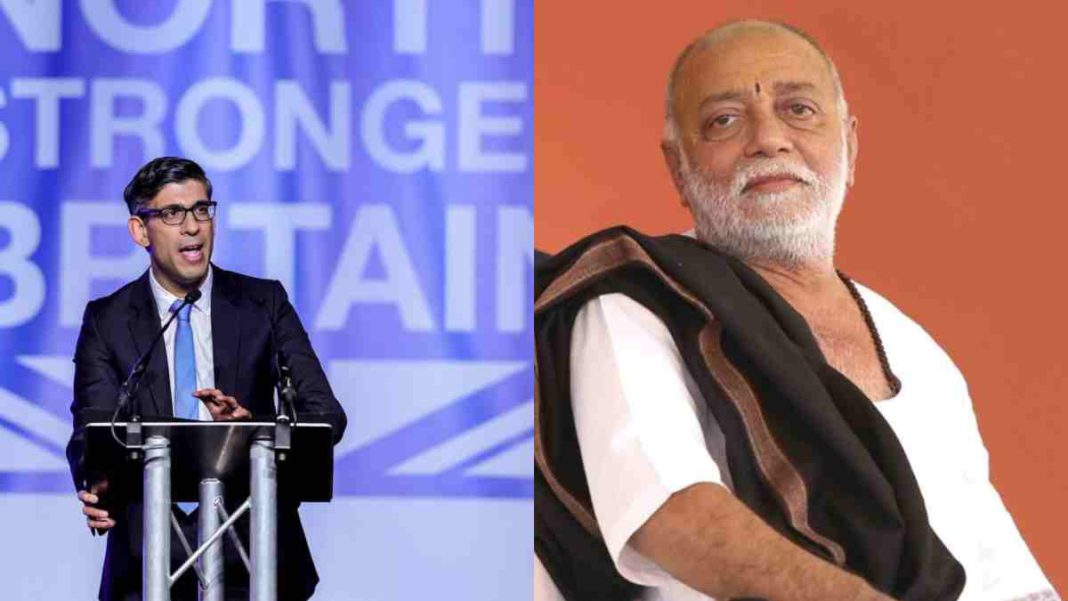UNITED KINGDOM: On the occasion of Indian Independence Day, Rishi Sunak’s presence at a Ram Katha event held at Cambridge University carried a distinct spiritual significance as he articulated that he was attending “not as a Prime Minister but as a Hindu.”
Expressing his gratitude, Sunak, the UK’s inaugural Prime Minister of Indian origin, who practices Hinduism with roots tracing back to Punjab, articulated, “Today, at Morari Bapu’s Ram Katha at the University of Cambridge, on Indian Independence Day, I find myself truly honored and pleased. Here, Bapu, I stand before you, not in the capacity of a Prime Minister, but as a Hindu.”
#RishiSunak at Morari Bapu’s Ram Katha at the University of Cambridge. Sunak greets everyone with -Jai Sia Ram. Tells Bapu, “I am not here as a Prime Minister but as a Hindu” pic.twitter.com/B5YbfcfkZm
— Megha Prasad (@MeghaSPrasad) August 15, 2023
Hailing from Southampton, Sunak’s appointment as the UK’s first Prime Minister of color has been embraced by Indians, who regard him as a son of their homeland.
Offering a warm welcome to the Prime Minister, the spiritual leader commented, “In our midst stands Rishi Sahab, not as a dignitary, but as an ordinary person. A heartfelt welcome to you. May the blessings of Lord Hanuman be upon you, and may the British populace reap prosperity.”
Sunak emphasized how his Hindu faith influences every facet of his existence, emboldening him to fulfill his duties as the Prime Minister of Britain in the finest manner possible.
“In my perspective, faith remains deeply personal. It acts as a guiding light across all aspects of my life. The role of Prime Minister brings immense honor but is equally laden with challenges. Making difficult decisions and confronting tough choices becomes essential. Our faith bestows upon me the fortitude, strength, and resilience to serve our nation to the utmost,” he conveyed.
While addressing the audience in the backdrop of an imposing golden portrayal of Lord Hanuman during Morari Bapu’s Ram Katha, the British Prime Minister reminisced about a “golden Ganesha gracing my desk at 10 Downing Street, evoking a sense of joy.”
“This effigy constantly reminds me of the importance of attentive listening and contemplation before taking action,” he divulged.
Sunak delved into his childhood recollections, highlighting visits to his local temple in Southampton alongside his family.
Sunak recounted that throughout his formative years, he cherished memories that arose of attending their neighbourhood temple in Southampton.
He mentioned that his family and parents would organize havans, pujas, and aartis, and after these rituals, he, along with his siblings and cousins, would assist in serving lunch and prasad.
He highlighted that their ethos, along with the daily pursuits of Bapu, reflected values such as altruistic service, devotion, and unwavering faith.
He pointed out that among these values, the most prominent was the principle of duty or sewa, as they comprehended it. He further noted that these values intrinsic to Hinduism seamlessly aligned with the quintessential British ethos.
Referencing the immigrant narrative of his family, Sunak acknowledged the numerous attendees at the Katha whose forebears had arrived in the UK with limited means from India and East Africa, yet managed to ascend the ladder to provide his generation with unparalleled opportunities.
Leaving an indelible mark, Sunak expressed, “As I depart this gathering, the words of ‘Ramayana,’ expounded by Bapu, resonate within me, along with the teachings of the ‘Bhagavad Gita’ and the ‘Hanuman Chalisa.'”
“For me, Lord Ram will eternally symbolize an inspirational figure, a beacon for confronting life’s adversities with courage, governing with humility, and engaging in selfless endeavors,” he added.
Concluding his address with the reverent phrase ‘Jai Siya Ram,’ he subsequently participated in an aarti on stage, accompanied by Morari Bapu, invoking the blessings of Lord Hanuman.
Also Read: Rishi Sunak’s Action against Green Group May Impact His Party in Elections, Academics Warn



